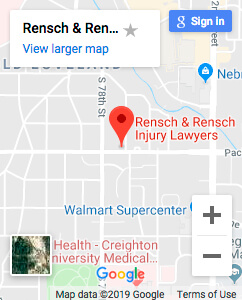How Can Senior Citizens Improve Their Driving Safety? 4 Tips from an Omaha Injury Attorney
It is never easy for senior citizens to give up their driving privileges. After a lifetime of hard work, relinquishing the ability to drive can be demoralizing. It is also inconvenient because seniors must rely on public transit, family, and friends for transportation. However, if a person cannot operate a vehicle safely – no matter his or her age – then he or she should not be behind the wheel.
As the Centers for Disease Control and Prevention explains, senior citizens are involved in a disproportionate number of accident injuries. Approximately 586 elderly people suffered crash injuries every day in 2012.
Fortunately, there are steps that elderly motorists can take to improve their driving skills. These include:
- Stay active;
- Undergo regular eyesight and hearing tests;
- Drive at the safest times;
- And manage your health conditions properly.
If you were injured in a crash that another driver caused, contact Rensch & Rensch Law. An accident lawyer in Omaha will evaluate your case to determine if you have grounds for a claim.
Our attorneys have litigated more than 100 jury trials, and if we do not win, then you do not pay attorneys’ fees. Call 1-800-471-4100 to schedule a consultation. You can also visit www.USAttorneys.com to learn more about personal-injury lawsuits in Nebraska.
Here are four tips that can help seniors stay safe behind the wheel:
- Stay Active
Physical activity can help you maintain strength and flexibility through your later years. This can help you check blind spots, turn the steering wheel, and make appropriate adjustments to unexpected hazards. Exercise can also boost your cognitive abilities, which can help you stay alert.
Stretching, strength training, and walking can all improve your health and driving ability. According to Mayo Clinic, incorporating these activities into your daily routine will support your physical and mental stamina.
- Undergo Regular Eyesight and Hearing Tests
Vision and hearing are essential for safe driving. You should schedule annual or bi-annual hearing and vision tests to ensure that your glasses and hearing aids are sufficient for your needs.
Although hearing may seem insignificant behind the wheel, it can help you avoid accidents. Car horns can alert you of precarious situations, or refocus your attention when distracted. Also, you must be able to hear ambulances, police, and other emergency vehicles as they approach.
Even if your vision seems fine during the day, bad eyesight can be deadly at night. This is especially true for drivers with glaucoma or cataracts. It is critical that you have the proper glasses for your vision and medical conditions.
- Drive at the Safest Times
Driving at the safest time of the day can decrease your risk of crashing. The stress of traffic congestion can increase the likelihood of heart attacks and strokes. Also, fewer vehicles on the road mean it is less likely that you will fall victim to a distracted or negligent driver.
- Manage Your Health Conditions Properly
Millions of seniors rely on medications to maintain their health and well-being. However, some prescriptions can adversely affect your driving ability.
You should never get behind the wheel after taking a new drug until you know how it will affect your visual, cognitive, and physical abilities. Ask your doctor or pharmacist if a particular medication will impact your driving.
If you were injured by a negligent motorist in Nebraska, contact Rensch & Rensch Law. An Omaha injury attorney can protect your interests and fight for the compensation you deserve.
Our lawyers have more than 45 years of combined legal experience. Call 1-800-471-4100 to schedule a consultation.



